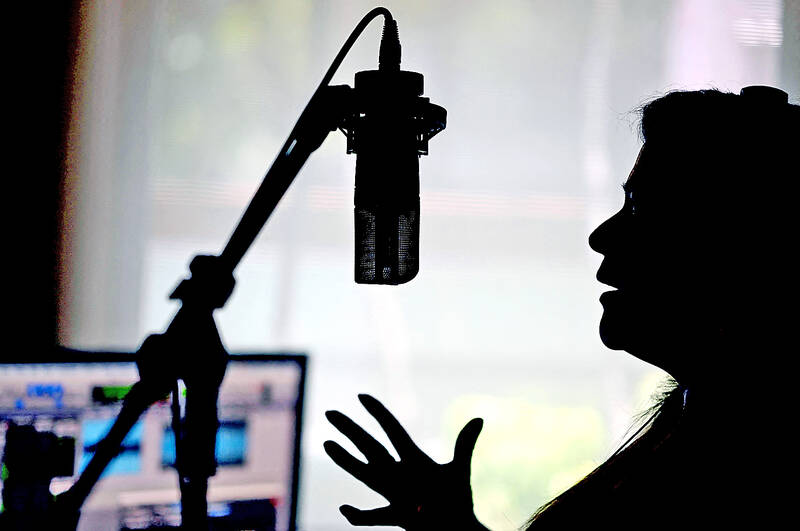Over the years, Cissy Jones, a voice actor with many credits, including video games Starfield and Baldur’s Gate III, has performed countless fictional mishaps.
Death by gunshot is easy, whereas death by fire can be long and tedious, Jones said.
One time, she played an astronaut in space who woke up breathing tensely.

Photo: AFP
Ten minutes into the scene, she came close to passing out, she said.
“Imagine your paycheck being dependent upon being able to sustain that,” she said
If Jones and her business partners succeed, sometime soon she might no longer have to, as such work would be outsourced to her “digital twin,” a vocal doppelganger powered by artificial intelligence (AI), she said.

Photo: AFP
Jones is the cofounder and vice president of strategic partnerships at Morpheme, a start-up aiming to harness AI to reshape how vocal performances are used in everything from animated series to video games.
It is the kind of venture that lately has tech investors excited — and all manner of creative professionals, from screenwriters to actors, on edge. Within the video-game industry, workers are concerned that AI could eliminate entire job categories, such as quality-assurance testers.
Morpheme’s AI software records audio from actors and then creates a model of their voice that can be used to alter, expand and enliven future productions. Recently, Morpheme has been demonstrating the technology to entertainment businesses, including several top gaming companies that it declined to identify, citing nondisclosure agreements.
Among other features, Morpheme is developing a library of exertion sounds, such as heavy breathing or shrieking, that clients would be able to reuse throughout the development process. That way, actors like Jones would not have to strain themselves as much, and producers can get all the bloody screams they need.
The software would also be able to render a performer’s voice into additional languages, making it cheaper and faster for companies to translate products across cultures.
Morpheme is entering an increasingly crowded market. Last year, investors poured US$378.6 million into voice-related AI start-ups across 47 deals, data from PitchBook showed.
Some are using AI to clone voices, alter voices and generate audio from text.
Recently, labor unions have raised urgent concerns about how such AI-technology would be incorporated by entertainment giants. It remains a point of contention in the ongoing strike by Hollywood actors and is flaring up on another front, as well.
Last month, video-game voice actors with the Screen Actors Guild-American Federation of Television and Radio Artists (SAG-AFTRA) authorized a strike amid ongoing negotiations with top gaming companies including Electronic Arts Inc, Take-Two Interactive Software Inc and Activision Blizzard Inc.
About 2,600 performers work under the Interactive Media Agreement. AI has been a sticking point. Actors fear entertainment companies would use AI to reproduce their voices without permission or payment, pushing down the value of their work.
“The unregulated use of artificial intelligence poses an existential threat to anyone who makes their living using their voice, image or performance,” union leader Ray Rodriguez said.
Jones said that she believes that she and her colleagues might be better off embracing the technology, albeit under the right conditions.
“It’s not going backwards,” she said. “It’s going to get better, cheaper, faster.”
Morpheme, which is privately funded and seeking additional investors, is banking on the idea that amid the mounting anxiety and potential work disruption, entertainment companies would embrace some rules of engagement.
Currently, Morpheme’s 20-plus employees are in regular conversation with voice actors, Hollywood agents, entertainment companies and SAG-AFTRA, hoping to stake out some middle ground among the competing interests.
A spokesperson for SAG-AFTRA said in a statement that the union has had “ongoing conversations,” with Morpheme, adding that “any use of digital replicas” must include a range of provisions, including “safe storage” and “appropriate compensation.”
A spokesperson for the gaming companies negotiating the interactive media agreement did not provide a comment.
A key part of Morpheme’s sales pitch is that it has created a pay model that is fair to actors. Under a broad and flexible contract, Morpheme would let performers approve of how their AI-engineered voice would be deployed and would compensate them for its continued use through a licensing fee.
After a year or so, they would have the option to renew or renegotiate. To keep score, Morpheme is also developing technology that would monitor and track how the companies are using the AI-generated or modified audio.
Recently, Morpheme signed on to a new campaign from the National Association of Voice Actors (NAVA) that has a mantra of “consent, compensation and control” around the use of AI.
“If we as humans mess this up, we’re gonna destroy ourselves,” said Morpheme cofounder and chief executive officer Brett Shapiro, who has worked in tech and entertainment for decades, including a stint at the gaming company Cosmic Forces Inc.
Unlike their kin in film or television, voice actors for video games do not receive residual payments after their recording sessions. Some gaming actors are looking at the emerging AI technology as an opportunity to potentially collect extra payments down the road on top of a base minimum.
Under Morpheme’s contract, actors who are unavailable or unable to work on a new project can put their “digital twin” to work, and, in exchange, receive additional money.
“There’s a licensing opportunity for me as a voice actor to get paid for the generation of that audio,” NAVA cofounder and president Tim Friedlander said. “The more my character becomes popular and people interact with it, the more I get compensated.”
Meanwhile, unauthorized uses of AI technology are already proliferating.
“We’re seeing people rip off publicly available content to create whatever they can in whatever fashion they want,” Jones said.
Jones said she has found that fans on TikTok are remixing her past scenes with words she “never said before, very clearly robotic.”
Some creators have honored her takedown requests, and others have not.
“There’s no consideration for the human behind the original art,” she said.

The US dollar was trading at NT$29.7 at 10am today on the Taipei Foreign Exchange, as the New Taiwan dollar gained NT$1.364 from the previous close last week. The NT dollar continued to rise today, after surging 3.07 percent on Friday. After opening at NT$30.91, the NT dollar gained more than NT$1 in just 15 minutes, briefly passing the NT$30 mark. Before the US Department of the Treasury's semi-annual currency report came out, expectations that the NT dollar would keep rising were already building. The NT dollar on Friday closed at NT$31.064, up by NT$0.953 — a 3.07 percent single-day gain. Today,

‘SHORT TERM’: The local currency would likely remain strong in the near term, driven by anticipated US trade pressure, capital inflows and expectations of a US Fed rate cut The US dollar is expected to fall below NT$30 in the near term, as traders anticipate increased pressure from Washington for Taiwan to allow the New Taiwan dollar to appreciate, Cathay United Bank (國泰世華銀行) chief economist Lin Chi-chao (林啟超) said. Following a sharp drop in the greenback against the NT dollar on Friday, Lin told the Central News Agency that the local currency is likely to remain strong in the short term, driven in part by market psychology surrounding anticipated US policy pressure. On Friday, the US dollar fell NT$0.953, or 3.07 percent, closing at NT$31.064 — its lowest level since Jan.

The New Taiwan dollar and Taiwanese stocks surged on signs that trade tensions between the world’s top two economies might start easing and as US tech earnings boosted the outlook of the nation’s semiconductor exports. The NT dollar strengthened as much as 3.8 percent versus the US dollar to 30.815, the biggest intraday gain since January 2011, closing at NT$31.064. The benchmark TAIEX jumped 2.73 percent to outperform the region’s equity gauges. Outlook for global trade improved after China said it is assessing possible trade talks with the US, providing a boost for the nation’s currency and shares. As the NT dollar

The Financial Supervisory Commission (FSC) yesterday met with some of the nation’s largest insurance companies as a skyrocketing New Taiwan dollar piles pressure on their hundreds of billions of dollars in US bond investments. The commission has asked some life insurance firms, among the biggest Asian holders of US debt, to discuss how the rapidly strengthening NT dollar has impacted their operations, people familiar with the matter said. The meeting took place as the NT dollar jumped as much as 5 percent yesterday, its biggest intraday gain in more than three decades. The local currency surged as exporters rushed to